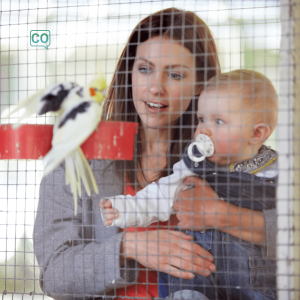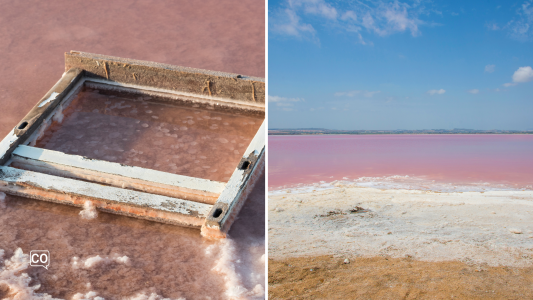Las diferentes caras de la naturaleza

Learning goals:
- Expresa tu admiración y asco (Express your admiration and disgust)
- Hablar sobre las diferentes facetas de la naturaleza (Talk about the different sides of nature)
-
"Qué" + adjetivo/adverbio ("Qué" + adjective/adverb) - Las salinas de Torrevieja (The salt flats of Torrevieja)
Learning module 2 (A2): Naturaleza y medio ambiente (Nature and environment)
Recap exercises of the previous lesson
Teaching guidelines +/- 60 minutes
Core vocabulary (10)

Nosotros respiramos tranquilamente en la naturaleza.
(We breathe calmly in nature.)
Respirar
(To breathe)

Qué agradable es el olor de las flores en el bosque.
(How pleasant is the smell of flowers in the forest.)
El olor
(The smell)

El paisaje es bonitísimo en primavera.
(The landscape is really beautiful in spring.)
Bonito
(Pretty)

La rosa es fascinantísima en el ramo de flores.
(The rose is very fascinating in the flower bouquet.)
Fascinante
(Fascinating)

La vida en el campo puede ser interesantísima.
(Life in the countryside can be very interesting.)
Interesante
(Interesting)

Este paisaje es más natural que el anterior.
(This landscape is more natural than the previous one.)
Natural
(Natural)

Qué agradable es la naturaleza cuando la exploramos.
(How pleasant nature is when we explore it.)
Agradable
(Pleasant)

Qué araña desagradabilísima es esta, busca otro lugar que naturaleza no ve.
(What an extremely unpleasant spider this is, find another place where nature is not seen.)
Desagradable
(Unpleasant)

Qué asqueroso es este insecto en la naturaleza.
(How disgusting this insect is in nature.)
Asqueroso
(Disgusting)
Listening materials
Our listening materials implement the verbs, vocabulary and grammar topics of this lesson. Audio and video available!
A2.11.1 Diálogo: Ana y Pedro hablan sobre la naturaleza
Spanish A2.11.1 Ana and Pedro talk about nature
Ana y Pedro conversan sobre los lados bonitos y desagradables de la naturaleza mientras pasean por el campo.
(Ana and Pedro talk about the beautiful and unpleasant sides of nature while they walk through the countryside.)
Teaching guidelines +/- 15 minutes
A2.11.2 Gramática: "Qué" + adjetivo/adverbio
Spanish A2.11.2 "Qué" + adjective/adverb
("Qué" + adjective/adverb can have different forms of use, depending on the context.)
Teaching guidelines +/- 15 minutes
A2.11.3 Cuento corto: Un paseo por el campo
Spanish A2.11.3 A Walk in the Countryside
Una corta historia sobre una chica que pasea por el campo.
(A short story about a girl who walks in the countryside.)
Teaching guidelines +/- 15 minutes
A2.11.4 Cultura: Las salinas de Torrevieja
Spanish A2.11.4 The salt flats of Torrevieja
Descubre las salinas de Torrevieja en Alicante. Un destino natural para admirar y disfrutar de él.
(Discover the salt flats of Torrevieja in Alicante. A natural destination to admire and enjoy.)
Teaching guidelines +/- 10 minutes
Exercises
These exercises can be done together during conversation lessons or as homework.
Exercise 1: Find the words
Instruction: Find the words, mark them and make sentences with the words.
Show answers Show hintsHints
Interesting , Pleasant , The smell , Fascinating , To breathe , Disgusting
Answers
Score: 0/6
| Interesante | (Interesting) |
| Fascinante | (Fascinating) |
| Agradable | (Pleasant) |
| Asqueroso | (Disgusting) |
| Respirar | (To breathe) |
| El olor | (The smell) |
Exercise 2: Reorder sentences
Instruction: The words in these sentences have been shuffled! Sort them so that they make a valid sentence again and translate.
Show answers Show translationExercise 3: Translate and make sentences
Instruction: Translate the words and phrases below and use it in a conversation or text.
Show answersExercise 4: Translate and use in a sentence
Instruction: Translate and say the word out loud. Use the word in a sentence.
Show translation|
1.
Bonito
|
(Pretty) |
|
2.
Agradable
|
(Pleasant) |
|
3.
Respirar
|
(To breathe) |
|
4.
Fascinante
|
(Fascinating) |
|
5.
Admirar
|
(To admire) |
Exercise 5: Conjugación verbal
Instruction: Choose the correct word, read the sentence out loud and translate.
Show answers Show translationRespirar (Presente, indicativo)
1. Yo ... profundamente.
2. Él ... muy bien en el parque.
3. Vosotros ... con alivio después de ver el camino.
4. Nosotros ... tranquilamente en la naturaleza.
5. Ellos ... profundamente cuando ven el río.
Exercise 6: "Qué" + adjective/adverb
Instruction: Choose the correct word, read the sentence out loud and translate.
Show answers Show translationbonito, asquerosa, olor, interesante, agradable, natural, asquerosas
1. ¡Qué ... parece este parque! Creo que todo es orgánico.
2. ¡Qué ... es la granja en el campo! Siempre me ha dado asco.
3. ¡Qué ... son las moscas! No me gusta verlas en casa.
4. ¡Qué ... es respirar en este bosque, el aire es muy fresco!
5. ¡Qué ... tan agradable tiene el ramo de flores!
6. Después de ver los elefantes en el safari, Ana dice: "¡Qué ... es admirar a los animales!"
7. ¡Qué olor tan ... tienen estos girasoles! Me encanta.
8. ¡Qué ... es tu caballo, me encanta su pelo!
Exercise 7: Translate and make sentences
Instruction: Translate the words and phrases below and use it in a conversation or text.
Show answersAppendix 1: Extended vocabulary table
Core vocabulary
(10):
Verbs: 2,
Adjectives: 7,
Nouns: 1,
Context vocabulary:
4
| Spanish | English |
|---|---|
| Admira | Ana admires |
| Admirar | To admire |
| Agradable | Pleasant |
| Asquerosas | Disgusting |
| Asqueroso | Disgusting |
| Bonito | Beautiful |
| Desagradable | Unpleasant |
| El olor | The smell |
| Fascinante | Fascinating |
| Fascinantes | Fascinating |
| Interesante | Interesting |
| Natural | Natural |
| Respira | She breathes |
| Respirar | To breathe |
Appendix 2: Verb conjugation tables for this lesson
Respirar (to breathe)
Exercises and examples phrases
- yo respiro I breathe
- tú respiras You breathe
- él/ella respira he/she breathes
- nosotros/nosotras respiramos we breathe
- vosotros/vosotras respiráis You breathe
- ellos/ellas respiran They breathe
Exercise: Verb conjugation
Instruction: Choose the correct word, read the sentence out loud and translate.
Show answers Show translationRespirar (Presente, indicativo)
1. Yo ... profundamente.
2. Él ... muy bien en el parque.
3. Vosotros ... con alivio después de ver el camino.
4. Nosotros ... tranquilamente en la naturaleza.
5. Ellos ... profundamente cuando ven el río.



